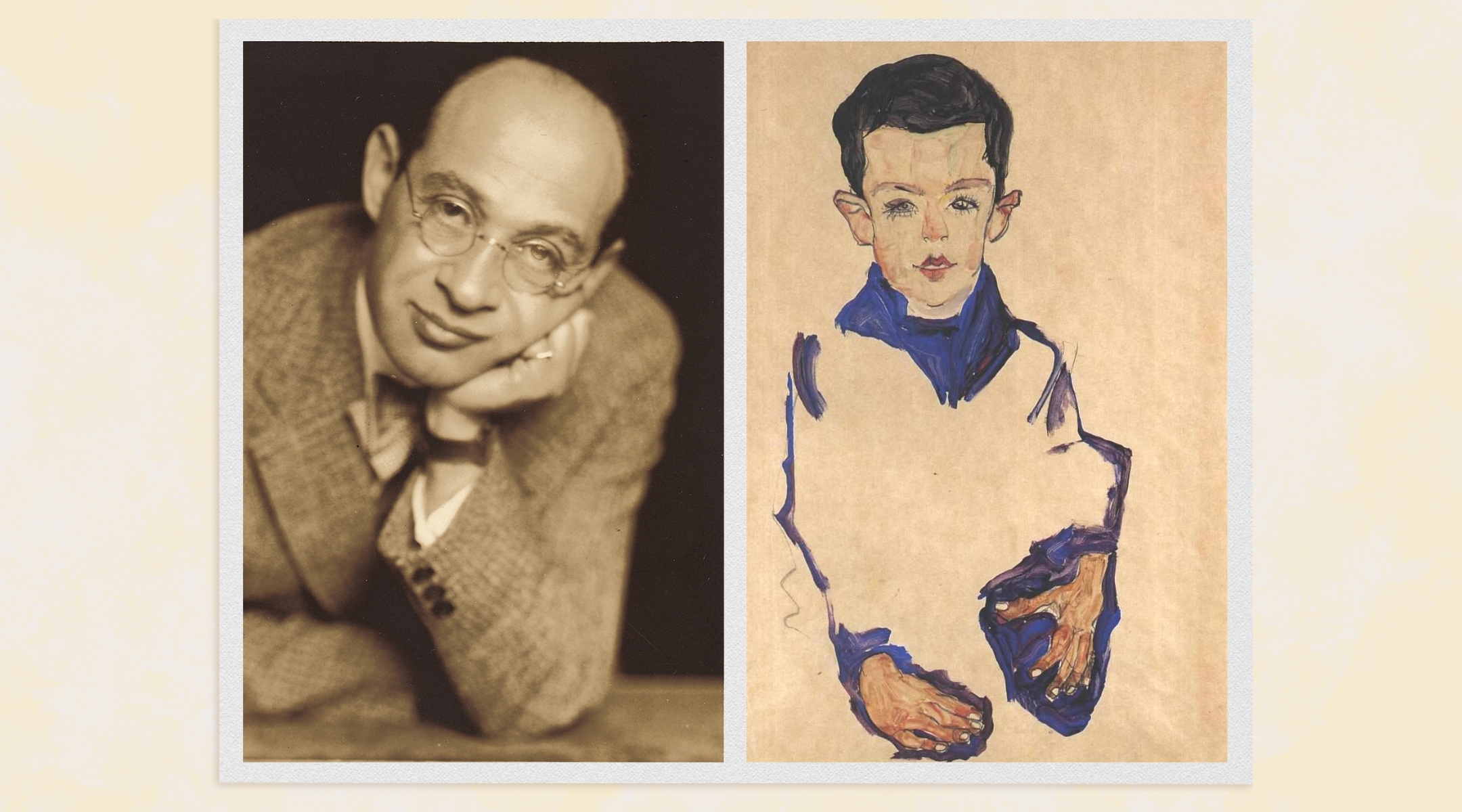7 Egon Schiele portraits to be returned to heirs of Jewish cabaret star murdered in the Holocaust
Efforts by Grünbaum’s heirs to reacquire the Schiele paintings has lasted more than 25 years and has been marked by legal battles due both to statutes of limitations and disputed claims

Fritz Grünbaum, left, was a Viennese Jewish cabaret performer with a vast Egon Schiele collection, including “Portrait of a Boy,” a preparatory study for the 1910 oil portrait of the son of one of Schiele’s first patrons, who became an important early commission for his artistic career. (via Getty and the Manhattan District Attorney’s Office)
(JTA) — Seven artworks by Egon Schiele will be returned to the heirs of a Jewish cabaret performer who had owned the pieces before being murdered in the Holocaust.
The works, most of them portraits of Schiele himself or his wife, were part of a massive art collection owned by the Viennese performer, Fritz Grünbaum, and are estimated to be worth a total of approximately $9.5 million. Grünbaum’s collection also included works by Albrecht Dürer, Auguste Rodin and Camille Pissarro, along with a total of 81 pieces by Schiele, an Austrian expressionist painter active in the early 20th century.
Before being seized by the Manhattan District Attorney’s Office earlier this year, the works were in the possession of several prestigious institutions, including New York City’s Museum of Modern Art, Morgan Library, Vally Sabarsky Trust and Ronald Lauder Collection, as well as the Santa Barbara Museum of Art. All seven portraits were seized and voluntarily surrendered by the institutions after they were shown evidence that the works were stolen by the Nazis.
The restitution announcement was made on Wednesday by Manhattan District Attorney Alvin Bragg and Ivan J. Arvelo, a special agent in charge at a branch of the U.S. Department of Homeland Security.
The effort by Timothy Reif and David Frankel — heirs and co-executors of the Grünbaum estate — to reacquire the Schiele paintings has lasted more than 25 years and has been marked by legal battles due both to statutes of limitations and disputed claims. One claim alleged that the paintings were never stolen, and were instead in the custody of a relative of the Grünbaum family for the duration of the war, until they were sold to art collectors.
Last week, three other Schiele works believed to have come from the Grünbaum collection were seized by Bragg’s office from the Art Institute of Chicago, the Carnegie Museums of Pittsburgh and the Allen Memorial Art Museum at Oberlin College in Ohio.
Schiele’s work was popular among Jewish art collectors, and was considered “degenerate” art, along with a wide range of other modernist works, by the Nazis. In October 2022, two of Schiele’s paintings, previously in Grünbaum’s collection, were auctioned for charity by Grünbaum’s descendants through Christie’s to support up-and-coming performing artists from underrepresented backgrounds.
As a cabaret artist, Grünbaum performed as a master of ceremonies and wrote operettas and songs. He was also known for his political activity: In 1910, when an Austrian officer made antisemitic remarks, Grünbaum slapped him and was challenged to a duel in which he was injured. In the 1930s, Grünbaum became a vocal critic of the Nazis both in his performances and in a weekly column for a Viennese daily newspaper.
In 1938, Grünbaum and his wife Elisabeth were arrested by the Nazis and he was forced to sign a document giving her power of attorney. Elisabeth was then forced to sign a paper claiming she voluntarily turned over her husband’s art collection to the Nazis. Grünbaum gave his last performance at the Dachau infirmary on Dec. 31, 1940. He died of tuberculosis two weeks later. Elisabeth is presumed to have died at the Maly Trostenets concentration camp near Minsk in 1942.
This article originally appeared on JTA.org.
A message from our Publisher & CEO Rachel Fishman Feddersen

I hope you appreciated this article. Before you go, I’d like to ask you to please support the Forward’s award-winning, nonprofit journalism so that we can be prepared for whatever news 2025 brings.
At a time when other newsrooms are closing or cutting back, the Forward has removed its paywall and invested additional resources to report on the ground from Israel and around the U.S. on the impact of the war, rising antisemitism and polarized discourse.
Readers like you make it all possible. Support our work by becoming a Forward Member and connect with our journalism and your community.
— Rachel Fishman Feddersen, Publisher and CEO


























